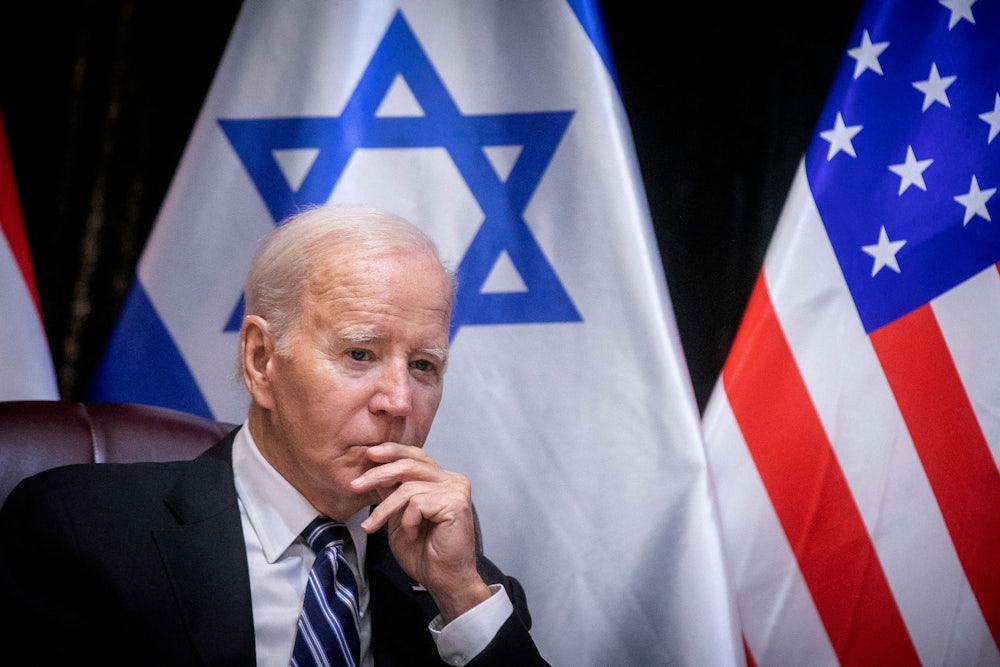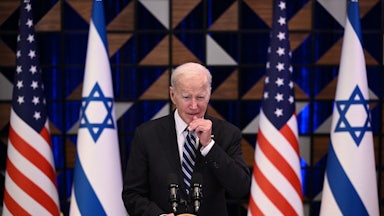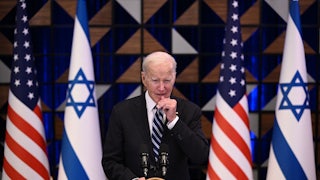Much of the coverage of Joe Biden’s speech in Israel on Wednesday has understandably focused on a warning. “Justice must be done,” Biden said, hours after arriving in Tel Aviv. “I caution this: While you feel that rage, don’t be consumed by it. After 9/11, we were enraged in the U.S. While we sought justice and got justice, we also made mistakes.”
It was an evocative and apt word of caution. The devastating attacks on civilians perpetrated by Hamas on October 7 recall the brutality of the September 11 attacks. But it’s also highly reminiscent of the errors in judgment that can be made in the hot haze of retribution, specifically the lack of concern for civilian deaths in retaliatory strikes and, relatedly, the apparent lack of concern for the potential short and long-term consequences of retaliatory actions in general. Israel, much like the United States did in response to 9/11, has adopted an abstract, possibly unfulfillable goal that justifies endless war: in this case, the eradication of Hamas.
Biden’s flick to the way our own military misadventures paved the road to regret was perhaps the only suggestion that restraint might be the more intelligent choice. The message was hardly subtle, even if Biden didn’t exactly spell it out. After 9/11, the U.S. blundered into two wars that each lasted longer than a decade, destabilized an entire region, and permanently tarnished its reputation. In related remarks, Biden called on Israelis to recognize the humanity of Palestinians, millions of whom are currently trapped in Gaza, with limited access to food, water, and electricity. “The vast majority of Palestinians are not Hamas,” Biden said. “Hamas does not represent the Palestinian people.”
Some of Biden’s rhetoric was overbaked—one presumes that when he says we received the “justice” we sought, he means the death of bin Laden and the destruction of Al Qaeda (more or less), a few highlights plucked from a mostly dreary reel. But it’s rare to hear a president speak about great national errors in this fashion. It certainly stands apart from notable past efforts to speak with a chastened tongue—one thinks of Ronald Reagan’s passive “mistakes were made” commentary offered in the wake of the Iran-Contra scandal.
Nonetheless, it’s hard to quibble with the comparison Biden attempted to make. These particular parallels with 9/11—perhaps the only ones that matter—are clear. Israel, bent on vengeance, has already killed thousands of Palestinian civilians in retaliation. The conflict is already spiraling out of control, and there is a very real possibility that it could touch off a regional conflict with profound, devastating, and unknown consequences. Israel may get a feeling of retribution, as America did after 9/11. But in doing so it may unleash a metric ton of devastation, also as America did after 9/11.
By invoking the September 11 attacks, Biden made it clear that he and his administration understand the potential, and indeed likely, risks of Israel’s profoundly dehumanizing and destructive response to Hamas’s heinous attacks. The problem was that the rest of the speech, in which Biden, in no uncertain terms, made it clear that his administration will continue to back those attacks for as long as possible, undercut the virtuous recollection of September 11. And there was one particular omission that stood out in its grave absence—the one word that could halt this deadly misery: cease-fire. The one unimpeachable position that Biden can take right now, as the fog of war threatens to consume everyone, is that a cessation of hostilities would be morally correct, politically sound, effective from a humanitarian perspective, and would push the conflict in the direction in needs to go right now: everyone sitting down and talking to one another.
The need for a cease-fire is especially great given that Israel’s prime minister, Benjamin Netanyahu, is an untrustworthy ally who is bent on exacerbating the conflict in order to prolong his loosening grip on power. “Netanyahu suddenly faces a long, bloody war with the Palestinians after spending most of his political career sidelining, short-shrifting, and underestimating them, all the while relying on his country’s military superiority—including its Iron Dome anti-missile system—to protect Israel,” wrote Foreign Policy’s Michael Hirsch. His Cabinet is stacked with far-right ultranationalists; he himself took a number of actions that explicitly elevated Hamas, all for his political benefit.
Even with its warnings, Biden’s speech mostly gave Netanyahu the political cover to continue striking Gaza with impunity. Thousands of missiles have struck Gaza over the last week, killing more than 3,000 Palestinians. “Hamas committed atrocities that recall the worst ravages of ISIS, unleashing pure unadulterated evil upon the world,” Biden said. He went on to say that his administration would be seeking an “unprecedented support package for Israel’s defense,” to the tune of $10 billion.
It’s impossible to square this gargantuan sum that Biden proposes to hand over to Netanyahu with his other admonitions, which call to mind the small fortunes that were lost to sinkholes in Iraq and Afghanistan. The administration is trying to do two equally impossible things at once. It is urging Israel, as Biden has said, to use restraint and avoid civilian casualties. At the same time, it is pledging to underwrite, to the tune of billions of dollars, weapons that will undoubtedly lead to vastly more civilian deaths.
What is Biden getting in exchange for this money? At the moment, he needs that leverage to buy him a freer hand to moderate Netanyahu’s approach to the war. Biden has promised $100 million in aid to Gaza and was able to ensure that food, water, and medicine would be able to enter Gaza via Egypt—welcome news given that an Israeli blockade has kept vital aid from reaching the area for days. But this was the extent of the rewards wrought by America’s diplomatic efforts.
Biden, notably, did not call for Israel to allow Palestinian civilians to peacefully evacuate, which means that hundreds of thousands of people are still effectively trapped in the line of fire. A planned summit in Jordan with leaders from that country, Israel, and Egypt was abruptly called off in the wake of the bombing of a hospital in Gaza that Biden said U.S. intelligence believes was the result of a failed rocket launch from a Palestinian militant group. Whatever avenue this might have provided to push for further diplomacy or concessions made to protect civilians throughout the conflict zone has been scuttled, at least for now. And without that summit, Biden was left to awkwardly thread a needle between vociferously backing Israel and urging restraint.
With Biden facing a spiraling conflict, logjammed diplomacy, and a yawning leadership vacuum, fixes are in short supply. Fortunately there is an off-ramp available—one that only a handful of Democrats, most of whom are progressives, have suggested: calling for a cease-fire. Without a cease-fire, there is little doubt that civilian deaths will continue to mount, both from Israeli airstrikes and a possible ground invasion of North Gaza, but also from the deprivation of food, clean water, and access to basic medical necessities that will follow in the wake of further military action. These deaths will only further inflame the conflict and tensions within the region and potentially precipitate its widening. Hamas’s attacks and the Israeli response have already all but destroyed the Abraham Accords. If it continues, it could bring the entire region into an uncontrollable, devastating, and unwinnable war.
A cease-fire is, of course, unlikely. Israel’s stated goal is the destruction of Hamas; a cease-fire would require negotiations with the militant group, which is unimaginable at this moment. Still, the cause of peace can’t advance if Biden doesn’t fix peace as his position—and writing billion-dollar checks to further fund the conflict certainly won’t push events in the right direction. But even limited success on this front will made a massive difference: A halt in the bombing to allow civilians to flee would buy time for diplomatic efforts—and to potentially find ground for a longer-term cease-fire. With his hoped-for diplomatic summit called off, Biden has only a limited array of options to push everyone on the path of least bloodshed. Calling for a cease-fire would, at the very least, change the conversation—and make better use of the knowledge hard won from actions we regret.










